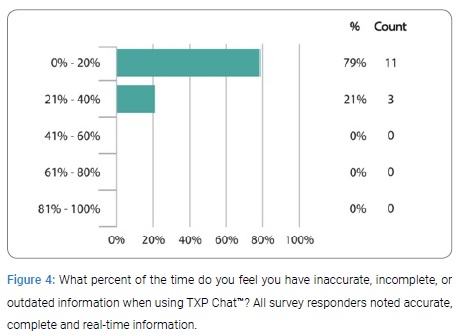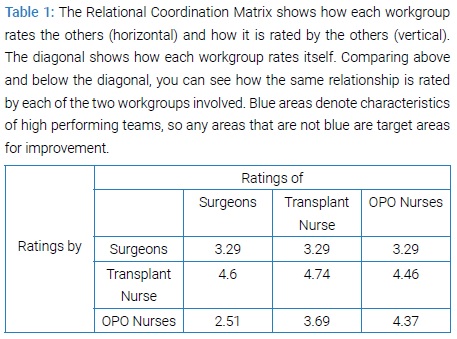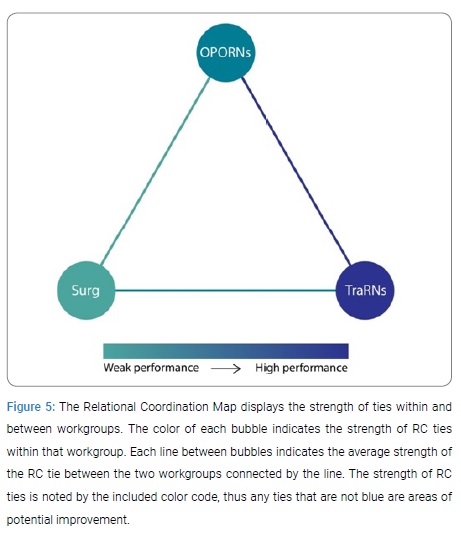Quality of Life and Productivity of Transplant Professionals is Improved Using a Mobile Application for Communication during Organ Procurement and Transplantation
Eric Pahl;
* Robert W Emery;
Michael Noce;
Suzanne Conrad;
Brynn Timm;
Nicole Patterson;
Rachel Glissman;
-
Eric Pahl: Department of Surgery, OmniLife, Health Informatics, University of lowa, USA.
-
* Robert W Emery: Department of Surgery, OmniLife, Health Informatics, University of lowa, USA.
-
Michael Noce: Department of Surgery, OmniLife, Health Informatics, University of lowa, USA.
-
Suzanne Conrad: Department of Surgery, OmniLife, Health Informatics, University of lowa, USA.
-
Brynn Timm: Department of Surgery, OmniLife, Health Informatics, University of lowa, USA.
-
Nicole Patterson: Department of Surgery, OmniLife, Health Informatics, University of lowa, USA.
-
Rachel Glissman: Department of Surgery, OmniLife, Health Informatics, University of lowa, USA.
-
May 05, 2020 |
-
Volume: 1 |
-
Issue: 3 |
-
Views: 6186 |
-
Downloads: 2077 |
Abstract
A limitation on the efficiency of procurement and utility of donated organs is the simultaneous coordination and communication among Organ Procurement Organizations (OPO) and transplant support teams. This applies to each organ which may be utilized for any given donor. Results of this study, currently “In Production” in the journal Progress in Transplantation, showed an improvement in communication and coordination using a real time effective, HIPAA compliant tool among procurement and transplant professionals. OPO teams reported enhanced quality of the monthly retrospective ROO reviews when supplemented with real-time documentation from TXP Chat™. Further, the data showed reduced redundant phone calls, faxes and emails, with increased clinical productivity. The APP’s effects on quality of internal and external communication, relationships, and team cohesion is the subject of this work. Quality of life for donor coordinators, transplant coordinators, and surgeons is particularly important for program administration because these groups suffer significantly higher rates of turn-over and burnout than other clinical professions.
Introduction
A limitation on the efficiency of procurement and utility of donated organs is the simultaneous coordination and communication among Organ Procurement Organizations (OPO) and transplant support teams. This applies to each organ which may be utilized for any given donor. This process most often involves multiple Transplant Centers (TC) and can result in hundreds of phone calls, emails, and faxes per donor. A recent syndicated news report from the Kaiser Foundation (Tucson Star, February 18, 2020) confirmed known data of donated organs that are discarded or lost, nearly half due to ineffective coordination and communication coupled with a lack of team cohesiveness [1,2]. OmniLife Inc. developed a smart phone application, TXP Chat™, (APP) and received a Small Business Innovative Research (SBIR) grant1R43LM012575-01to study the impact of this APP on the organ donation and recovery process. Results of this study, currently “In Production” in the journal Progress in Transplantation, showed an improvement in communication and coordination using a real time effective, HIPAA compliant tool among procurement and transplant professionals [3]. The APP facilitated the review of the report of organ offers (ROO), reduced time from offer to acceptance or decline, and contributed to a significantly shorter time from offer to transplantation with fewer organ discards and more organs transplanted. OPO teams reported enhanced quality of the monthly retrospective ROO reviews when supplemented with real-time documentation from TXP Chat™. Further, the data showed reduced redundant phone calls, faxes and emails, with increased clinical productivity. Transplant professionals were satisfied that information provided on the APP was accurate. This report is focused on the quality of life and productivity of procurement and transplant professionals with the use of TXP Chat™. The APP’s effects on quality of internal and external communication, relationships, and team cohesion is the subject of this work. Quality of life for donor coordinators, transplant coordinators, and surgeons is particularly important for program administration because these groups suffer significantly higher rates of turn-over and burnout than other clinical professions [4-6].
Material and Methods
A valid scientific method adapted for action-oriented learning, a Plan-Do-Study-Act (PDSA) approach was utilized at clinical sites that used the TXP Chat™ [7]. For the purpose of permitting analyzable data, the SBIR Phase I study was limited to a single OPO and kidney transplant center in Iowa. After one year, July 2017-August 2018, data was accumulated and assessed with the aforementioned results. An independent organization, Relational Coordination Analytics Inc.(RC), using this documented process to access team member metrics for RC Team score, tracking redundant phone calls, clinical productivity and team reactions to training and use of the APP was conducted [8,9]. The intervention cohort consisted of 39 users: 8 surgeons, 16 transplant center coordinators and 15 OPO coordinators.
Results
Quality of life and productivity improve organ donation, organ quality and outcomes using the APP. Thus, RC initially conducted a survey of users to determine disruptions in the conduct of the organ retrieval and transplant process. The results are shown in (Figure 1) and indicate that half of responders made more than 25 phone calls and 14% 10-20 for any given 24-hour shift.
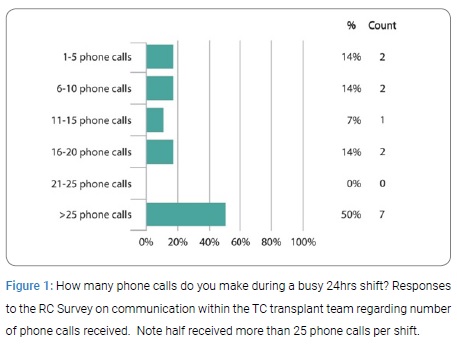
When TXP Chat was introduced, 93% of responders were satisfied or more than satisfied with communication among the Internal Team and 86% were similarly satisfied with communication with respect to External Partners (Figure 2 and 3).
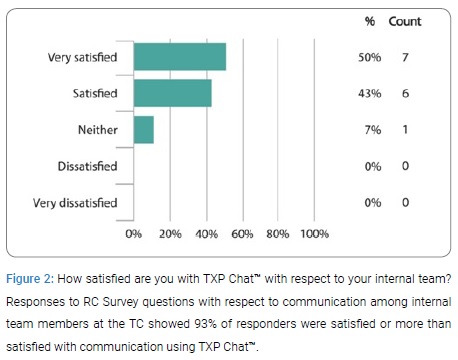
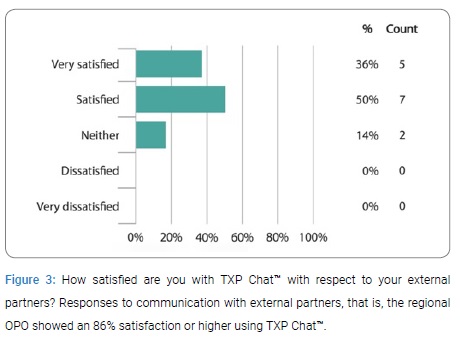
Importantly, 93% indicated that productivity was improved due to the reduction of multiple and redundant phone calls during the assessment and retrieval process. Further, 100% of respondents reported there was no inaccurate, out of date or lost information using TXP Chat (Figure 4).
Lastly, Communication was strongest among OPO and Transplant nurse coordinators and weakest among both nursing staffs and surgeons (Table 1) shown graphically in (Figure 5).
Discussion
Comment: Decreased productivity and quality of life are of particular concern to transplant professionals, this due to the quantity and repetitiveness of emails, faxes and phone calls to and from OPO staff, transplant coordinators, surgeons, OR teams and patients. Further, rechecking the quality and accuracy of data, adds to disruption to ongoing medical services, particularly impactful in time sensitive organs such as the heart and lungs. It is common to hear that the transplant profession is for the younger participants. The end result is that experience often falls to fatigue and burn out. The use of modern communication tools in clinical medicine, developed along the lines of those used in social applications, can not only improve the number and quality of organs transplanted, reduce time from offer to transplant and increase the number of organs offered due reduced time to acceptance or refusal and decreased wastage, but as data in this study indicate, improve internal and external communication. The study found areas of weakness, where further improvements in the work place environment can be made, particularly communication among surgeons and transplant nursing personnel. This deficit may result from several potential causes, including but not limited to: Fatigue, off-hour calls, enhanced responsibility of transplant nursing staff in this private practice setting and/or smaller number of surgical staff, all of which can be addressed with TXP Chat™. This effective and secure communication APP as found in the qualitative surveys of users in the Iowa OPO/transplant network, clearly demonstrated improvements in productivity, job satisfaction and quality of life.
Limitations: The data acquired, while validated in other studies, is qualitative and has potential to be biased by time of survey and hours worked. The number of participants was small and only a single OPO and TC transplanting kidneys only were studied. Due to methodological design, the substantial performance increase cannot solely be attributed to the use of TXP Chat™. A larger study, using additional organs has been initiated under a SBIR Phase II, Library of Medicine, NIH grant1R43LM012575–02.
Conclusion
The use of TXP Chat™ mobile APP, equipped with real time machine learning tools providing rapid, secure and accurate information used for clinical decision-making results in a more efficient and effective workplace. TXP Chat™ is useful for the variety of work roles among transplant professionals. Team cohesiveness at both TC and OPO environments improved with fewer interruptions, leading to increased clinical productivity and case awareness. With productivity enhancement and reduced interruptions, quality of life of users is improved.
References
- Aleccia J. How Lifesaving Organs For Transplant Go Missing In Transit. Kaiser Health News.
- Mittal S, Adamusiak A, Horsfield C. A re-evaluation of discarded deceased donor kidneys in the UK: Are usable organs still being discarded? Transplantation. 2017;101(7).
- Pahl E, Emery RW, Noce M, Conrad S, Patterson N, Timm B. Mobile application for communication increases the efficiency of organ procurement and transplantation. Prog Transplant. 2020;1–5.
- Jesse MT, Abouljoud M, Eshelman A. Determinants of burnout among transplant surgeons: A national survey in the United States. Am J Transplant. 2015;15(3):772–8.
- Jesse MT, Abouljoud MS, Hogan K, Eshelman A. Burnout in transplant nurses. Prog Transplant. 2015;25(3):196–202.
- Kress J, Smith DL, Fehling PC, Gordon EJ. Improving the recruitment and retention of organ procurement coordinators: A survey study. Am J Transplant. 2009;9(6):1451–9.
- Langley GJ, Moen RD, Nolan KM, Nolan TW, Norman CL and Provost LP. The Improvement Guide: A Practical Approach to Enhancing Organizational Performance. John Wiley & Sons, Inc.; 2009.
- Gittell JH. Relational Coordination: Guidelines for Theory, Measurement and Analysis. Inf Syst Res. 2011;565–85.
- Havens DS, Vasey J, Gittell JH, Lin WT. Relational coordination among nurses and other providers: Impact on the quality of patient care. J Nurs Manag. 2010.
Cite this article
Pahl E, Emery RW, Noce M, Conrad S, Timm B, Patterson N, et al. Quality of life and productivity of transplant professionals is improved using a mobile application for communication during organ procurement and transplantation. Clin Surg J. 2020;1(3):1–4.
Copyright
© 2020 Robert W Emery. This is an open access article distributed under the terms of the Creative Commons Attribution 4.0 International License (CC BY-4.0).



